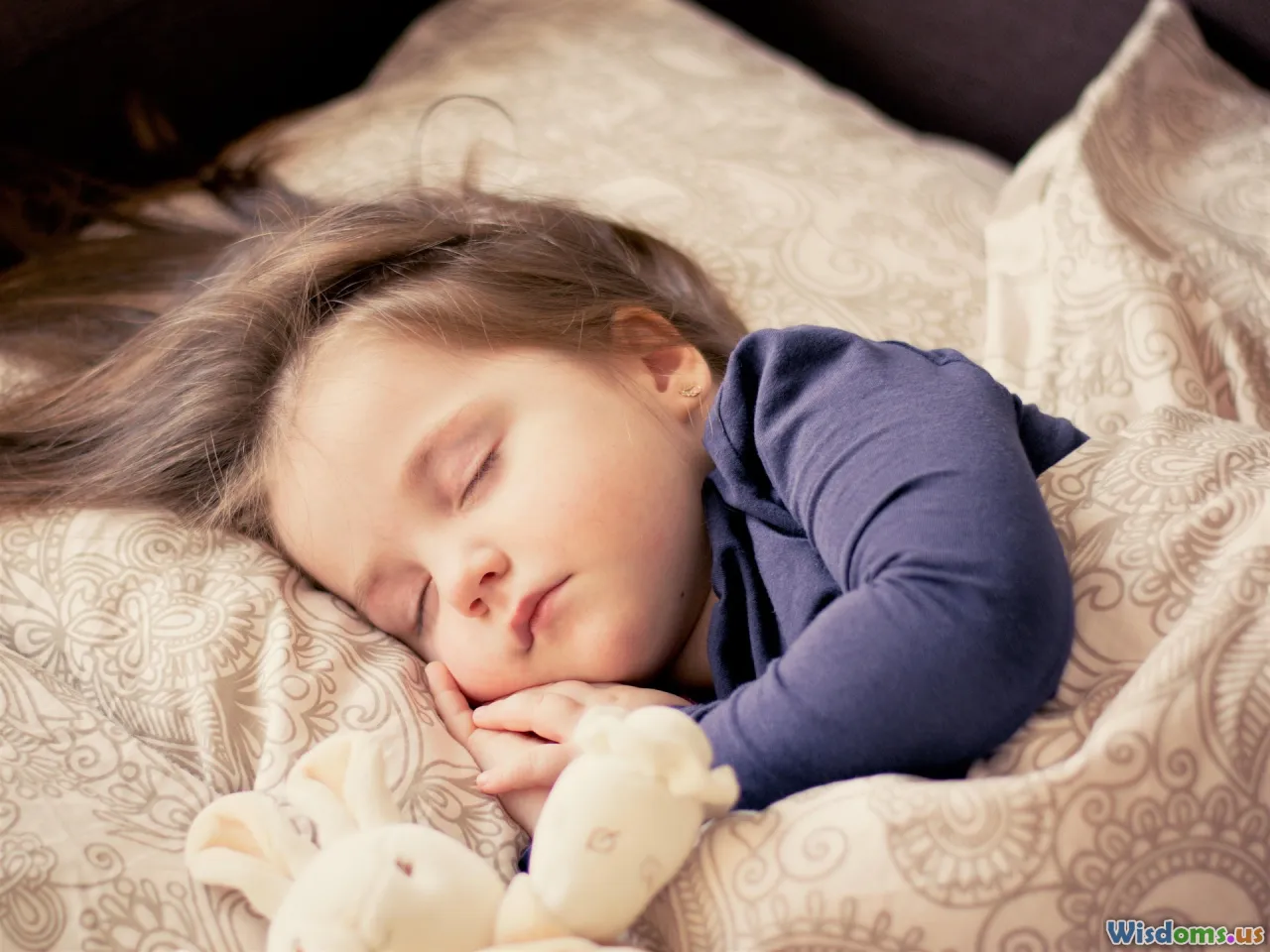
Surprising Ways Sleep Influences Emotional Brain Function
14 min read Explore the unexpected ways sleep shapes emotional brain function and mental health, and learn strategies for optimizing your nightly rest. (0 Reviews)
Surprising Ways Sleep Influences Emotional Brain Function
Whether you're cramming for an exam, binge-watching a show, or burning the midnight oil at work, sacrificing sleep can feel like an act of heroism. But science tells a different story: every lost hour of sleep comes at a price—sometimes paid directly by our emotions and the architecture of the brain itself. Sleep is more than rest; it's a hidden influencer gently shaping how we think, feel, and respond to the world.
Sleep: The Brain's Emotional Reset Button

Sleep isn't just a passive act—it's an active and dynamic process crucial for maintaining emotional stability. Throughout the night, your brain undergoes different sleep cycles, notably REM (rapid eye movement) and slow-wave sleep, each playing a vital role in how you process emotions.
Key Insight: Research published in Nature Reviews Neuroscience highlights that REM sleep is particularly important for emotion regulation. REM deepens the neural connections of positive memories and helps de-link negative emotional intensity from past events.
Example: After a difficult day, you might "sleep on it" and wake with feelings of distress substantially muted. Studies from UC Berkeley found that overnight sleep—especially during REM—lowers the reactivity of the amygdala, the brain's emotion center, making us less likely to overreact the next day. Less REM means heightened emotional sensitivity and increased risk for anxiety and mood disorders.
The Role of Sleep in Emotional Memory Consolidation

Have you ever wondered why emotionally charged memories—embarrassing moments, joyful celebrations, or traumatic incidents—often appear in dreams? That’s because your brain uses sleep to make sense of emotionally laden experiences.
How Sleep Strengthens—and Softens—Emotional Memories
During REM sleep, the brain replays emotional experiences, integrating them into long-term memory. This doesn’t simply freeze memories in place; it also softens the emotional blow, thanks to the dampened levels of the stress chemical norepinephrine in the REM state.
- Protective Mechanism: A 2017 study published in Current Biology demonstrated that sleep strengthens memory traces while removing the distress, making it easier to recall the event without reliving its emotional charge.
- Nightmares and PTSD: In post-traumatic stress disorder (PTSD), this memory-emotion decoupling fails—nightmares persistently relive trauma. This insight is fueling new sleep-based therapies for trauma survivors.
Tip: To promote healthy emotional memory processing, maintain a consistent bedtime and keep stimulants like caffeine out of your evening routine.
Emotional Intelligence Is (Literally) Built Overnight

Emotional intelligence—the bedrock of empathy, self-control, and social skills—relies on healthy sleep. When you’re well-rested, the connections between the brain’s prefrontal cortex (the seat of decision-making and impulse control) and the amygdala (our fear and emotion center) are robust and flexible.
Impact of Sleep Deprivation:
- Impaired Empathy: A team at the University of California found that sleep deprivation cuts empathy by as much as 30%. Participants struggled to interpret facial expressions and emotional cues, leading to misunderstandings and social friction.
- Impulse Control: Lack of sleep weakens the top-down control the prefrontal cortex holds over the amygdala. The result? Emotional outbursts, poor judgment, and overreacting to minor setbacks. Over time, chronic sleep restriction can resemble the emotional volatility seen in mood disorders.
How-To for Smarter Emotional Responses:
- Prioritize 7–9 hours of sleep, especially before crucial conversations or high-stress interactions.
- When a night’s rest is missed, recognize your emotional responses might feel exaggerated—and take a step back before reacting.
Circadian Rhythms and Social Mood Swings

We often blame our fluctuating moods on work stress or family dynamics. But underneath, the circadian rhythms—your internal biological clock—govern both sleep-wake cycles and the ebb and flow of social emotions.
Science Speaks:
- Studies show night owls are more likely to report loneliness, negative thinking, and emotional unease. Social jetlag (a mismatch between our biological clock and external demands) can exacerbate feelings of isolation and even depress immune function.
- Teenagers, who naturally shift to a later sleep schedule, can find themselves at odds with school start times, raising the risk of irritability and peer conflict.
Actionable Advice:
- Tune your sleep routine to your natural rhythms—aim for sleep and wake times that feel easiest to maintain consistently.
- Invest daylight time in social activity; natural light exposure helps anchor your emotional and circadian clock.
Sleep and the Fight-or-Flight Response

Ever felt edgy or overreactive after pulling an all-nighter? That’s not just lack of willpower—it’s biology. Sleep deprivation turbocharges the body’s fight-or-flight response, flooding your system with cortisol and adrenaline.
- Amplified Stress: Lack of sleep increases baseline stress hormone levels even during calm periods, priming you to interpret ambiguous events as threatening.
- Reduced Recovery: Typically, sleep—especially deep slow-wave sleep—counters stress hormones, repairing and calming emotional circuits. When that restoration is disrupted, even everyday stress feels more overwhelming.
Compare:
- Participants in a University of Pennsylvania experiment who faced emotional tasks after only four hours of sleep were 60% more likely to choose aggressive solutions and interpret neutral faces as hostile compared to those who slept a full night.
Tips for Calming the Fight-or-Flight System:
- Wind down with calming rituals before bed—think reading, light stretching, or mindfulness meditation.
- Avoid heavy discussions, blue screens, and news cycles in your final waking hour; they can spark stress brainwaves, making it harder to transition to restful sleep.
Chronic Sleep Loss and the Risk for Mood Disorders

The link between routine sleep loss and major mood disorders is more than coincidental—it's causative. Insomnia and poor sleep not only predict the onset and severity of depression and anxiety, but worsening sleep feeds a vicious cycle, making these mental health challenges harder to treat.
Sleep as an Intervention
- Prevention: The American Journal of Psychiatry reports that adolescents with consistent 8-hour sleep are 68% less likely to develop clinical depression over a two-year period.
- Treatment: Cognitive Behavioral Therapy for Insomnia (CBT-I) is now considered a frontline treatment for depression and PTSD—helping both sleep and mood to improve.
Practical Actions:
- Keep a sleep journal—track sleep quality alongside mood swings to pinpoint patterns.
- Treat sleep issues as seriously as you would physical ailments—seek professional care if insomnia persists.
Dreaming: The Unexpected Therapist in Your Brain

Dreaming is more than nonsense images; it’s the brain’s organic therapist. During REM sleep, dream sequences replay, remix, and contextualize daily emotional challenges. Researchers believe dreams integrate new information with past experiences and ambitions, offering creative solutions and enhancing emotional insight.
Compelling Example:
- Artists and writers, including Mary Shelley and Salvador Dalí, credited dreams with inspiring their works—a testament to sleep’s hidden role in creativity and emotional problem-solving.
Analyzing Dream Patterns:
- Increased vivid nightmares often accompany trauma or severe anxiety—an early warning signal to rebalance sleep habits.
- Noting themes from repeated dreams can alert you to unresolved emotional concerns, providing a natural prompt for self-care.
Sleep Quality vs. Sleep Quantity: What Matters Most for Emotions?

It isn’t just how much you sleep, but how well you sleep that determines your emotional resilience. Fragmented sleep—even when the total hours are high—undermines the crucial emotional cleansing and memory integration of deep and REM sleep stages.
Case Analysis:
- A 2022 Harvard Medical School study found that broken sleep (frequent awakenings) correlated significantly with next-day irritability and a 50% increased risk of workplace accidents, compared to those who slept uninterrupted.
Your Emotional Sleep Toolkit:
- Create a dark, cool, and quiet sleep environment.
- Keep a calming pre-sleep routine—consistency helps cue the brain that bedtime is near.
- Minimize nighttime noise and screen exposure to preserve uninterrupted sleep cycles.
The Social Benefits of Sleeping Well

There’s more at stake than your mental health: well-rested people are more likable, trustworthy, and approachable. Sleep deprivation subtly dulls positive social signaling—eyes narrow, facial expressions cool, and even voice tone flattens.
- Empirical Evidence: Swedish researchers found that strangers rated well-rested faces as healthier and more attractive compared to fatigued faces in a controlled comparison. In more interactive tests, sleep-deprived individuals were shunned more frequently in group tasks.
Team Dynamics Advice:
- Schedule high-stakes meetings during times you're most well-rested, ideally after a restorative night’s sleep.
- Encourage open conversation about sleep and burnout in your teams—it boosts wellness and workplace empathy.
Making Sleep Your Emotional Ally

Mastering emotional intelligence, enjoying social connections, and thriving under pressure are as much about your resting hours as your waking ones. Ignoring the sleep-emotion link leaves the brain unshielded in a storm of daily stressors.
Action Steps:
- Treat sleep like a key health pillar—plan for it, defend it, and optimize it.
- When emotions run high, pause and consider: is your brain simply tired? Often, the fastest path to clarity is a solid night’s rest.
By nurturing your sleep, you harness your brain’s most powerful tool for emotional health, moving through your days with steadiness, clarity, and resilience. Tonight, let the gentle pull of sleep work its quiet magic—you might be surprised by how much brighter the emotional landscape looks in the morning.
Rate the Post
User Reviews
Popular Posts















